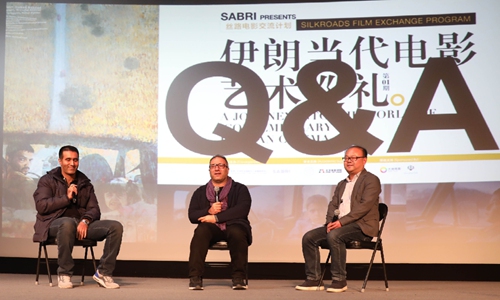HOME >> ARTS
Exclusive interview with Iranian director Reza Mirkarimi
By Bi Mengying Source:Global Times Published: 2019/11/19 17:53:40

Reza Mirkarimi (center) attends a Q&A session at Tsinghua University in Beijing on November 7. Photo: Courtesy of SABRI
Iranian family drama Castle of Dreams was a big winner this summer at the 22nd Shanghai International Film Festival, where it claimed the awards for best actor, best director and best feature film. Recently, the film's director Reza Mirkarimi returned to China for two more screenings of the film and sat down with media to discuss the two countries' cinematic landscape with Chinese audiences.
Meaningful conversations
Castle of Dreams depicts the story of an ex-con who comes back into his children's lives after being absent for years. The Hollywood Reporter called it "subtly written and sensitively directed," and a psychological drama that "nimbly teases out the meaning of fatherhood and the responsibility it entails."
Since the film was so well-received among Chinese cinephiles, available seats for the screenings, both of which were held on November 7, filled up rather fast.
The first was held in the afternoon at the Beijing Film Academy (BFA), China's top college specializing in film and TV production, followed by a screening at Tsinghua University in Beijing, which was hosted by Tsinghua's Student Association of the Belt and Road Initiative (SABRI). Castle of Dreams was also chosen to be the debut film for SABRI's Silk Road Film Exchange Program.
Yu Xiao, president of SABRI, told the Global Times on Wednesday that the program aims to introduce excellent films by countries and regions along the Belt and Road to Chinese audiences.
"Iran and China are both countries with long histories and rich cultures. It is crucial for the two countries to cultivate cultural exchanges and academic connections," said Yu.
Given Iranian films' outstanding global recognition, especially in recent years, and Mirkarimi's reputation in China, Castle of Dreams was chosen to kick off the program.
"For the last few months, I have traveled to many countries such as the UK and Turkey, where we also held Q&A sessions. Yet the questions asked at Tsinghua and BFA were special and specific, questions that hadn't been asked before. These questions were about details and the inner layers of the film. For instance, the students wanted to know the meanings of the symbols used in the film," Mirkarimi told the Global Times on November 11.
Opportunities for cooperation
In addition to questions and comments about Castle of Dreams, one audience member at the Tsinghua screening expressed curiosity regarding the development in Iran of science fiction films, a genre that he feels has seen significant progress in recent years.
"Iran can learn from China in terms of sci-fi movies, ancient movies and action movies. These genres in Iran are not mainstream. We don't have enough capacity to achieve what we want and we need to," said Mirkarimi.
Meanwhile, Iranian films such as Children of Heaven, A Taste of Cherry from the 1990s, and the more recently released The Salesman and A Separation, have made deep impressions on Chinese audiences. Mirkarimi pointed out that Iran specializes in films like these, with realistic themes and stories about human relations and human emotions, and it is this aspect that the director said he feels Iran can probably help China. He noted that more Chinese directors are trying to focus on human relations in films.
Stronger connection
"In ancient times, we were connected to each other in terms of the economy and culture through the Silk Road. But unfortunately over the past few hundred years, we haven't had as many cultural connections as in the past. Much of the connections happen through Europe," said Mirkarimi.
Although he was very familiar with the work of Chinese directors such as Chen Kaige and Zhang Yimou, the first time he met them was at European film festivals such as Cannes and the Venice International Film Festival.
"China and Iran are both in the East of the world. We have these common Eastern feelings…There are many Chinese film experts that I'd like to work with, as I've seen their work on the screens at international film festivals," said Mirkarimi.
He stressed that opportunities for direct exchanges about films is continuously improving thanks to efforts on both sides.
While Mirkarimi has received many invitations from film festivals and collaborations with Chinese film professionals, he is currently considering shooting a family drama set in a small city in China and making an animated TV series for children, possibly about the Silk Road and cultural exchange with China.
"I have been the director of the Fajr International Film Festival the last four years. Chinese cinematic people have been invited to the festival," said Mirkarimi.
Some of the Chinese films have won awards at different sections at this prominent annual film festival, held every April in Tehran, Iran.
In terms of international development for Chinese films, while Mirkarimi acknowledged his great appreciation for them, he also said he believes that there's still room for growth.
"They are not as successful as their capacity allows them to be," he said.
He recommended that filmmakers shift focus onto the lives of ordinary people instead of looking at things from a grand perspective, as well as shoot more films with realistic themes rather than blockbusters.
"For finding a good story, you really do not need to put yourself under a lot of pressure to travel to far places, to look for big events or anything. If you look at the people around you, what is happening around you, you can find a very good story. That happens, if you believe that nothing repetitive exists. Whatever happens, it will be something new," he said.
Newspaper headline: Talking about film
Posted in: CULTURE & LEISURE